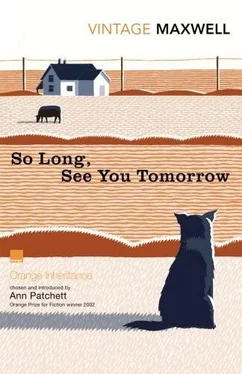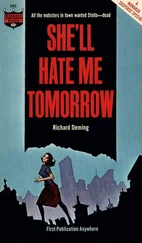That evening, the sheriff went to the house of Clarence Smith's parents and learned that they had no idea where their son was. Neither had anyone else. He was last seen leaving the Grand Theater at 10:45 on the night before Lloyd Wilson was killed. The State's attorney didn't issue a warrant charging Cletus's father with the murder. He was merely wanted for questioning. The description sent to the police throughout the state reads: "Age 40 years, height j feet 7 inches, weight 165 pounds, light brown hair slightly bald."
Neighbors reported that they had seen a strange automobile waiting near the Wilson farm on the night before the murder. One of them said that the automobile waited in the lane just off the hard road for at least two hours. He saw it for the last time at about nine o'clock, just before he went to bed. Another neighbor said that the automobile was not in the lane but at the edge of the hard road, and that it was standing with the lights turned off. Since Clarence Smith did not own a car, this raised the question of whether he might have had an accomplice.
There was a rumor that he was seen boarding the trolley car that ran between Peoria, Lincoln, and Springfield, on the day of the murder. Also that he had registered at a hotel in Springfield and that same night had received a long-distance telephone call there. Given the chance to believe something so interesting, people did, though the hotel denied that he had been there, and the person who saw him board the trolley never came forward. The rumor that he had a large sum of money on his person when he disappeared couldn't have been true either, since the money from the sale of his lease could all be accounted for.
There was another angle to the case that the Courier felt obliged to consider. In the spring of the year before he was killed, Lloyd Wilson's wife left him, taking their four girls, the youngest of whom was a baby eleven months old, and moved to town. She did not divorce him but got a legal separation. By the terms of this agreement he had to pay her $9,000, which in 1921 was a lot of money. My father's new house only cost $12,000, including the land it was built on. The settlement Lloyd Wilson made on his wife may have represented all the money he had.
I don't know what she looked like. Most farm women of her age were reduced by hard work and frequent child- bearing to a common denominator of plainness. I fancy, as people used to say when I was a child — I fancy that this was true of Lloyd Wilson's wife and that it was not true of Cletus's mother, but there is no warrant for my thinking this, and the simple truth is that though so much is made of the woman's beauty in love stories, passion does not require it. Plato's idea that lovers were originally one person, the two parts having become separated and desiring to be joined, is as good an explanation as any for what cannot in the mind of an outsider ever be convincingly accounted for.
The names and ages of the Wilson children were printed in the paper. Probably through happenstance, the names and ages of Clarence Smith's were not.
Cletus's mother had been an orphan and was brought up by an aunt and uncle, who lived in town. When she left Cletus's father she moved back to the house she grew up in. The Courier-Herald gives the address, and I asked my cousin to see if there was a house at that address now. He reported back that there was and that it was one of a row of frame houses opposite the fairgrounds. Somewhat down at the heels, he said, and painted white, and like a lot of other small houses in town.
What the newspaper refers to as "the estrangement" occurred during the summer after Wilson's wife left him. "A year ago," the Courier-Herald goes on to say, "there were no better friends than Wilson and Smith. They were often in town together. If Smith bought a cigar for himself he also bought one for Wilson, who did the same. In an argument they stuck up for each other against all coiners, and people often spoke about what bosom friends they were. Smith is considered, by people who knew him, to be a quiet, reserved man."
The only photograph I have ever seen of him, or of Lloyd Wilson, was printed on the front page of the Courier- Herald. Since it is a photostatic copy, black and white — or rather, brown and white — are reversed. Even so, they look enough alike to be taken for brothers. No doubt Cain and Abel loved each other, in their way, quite as much as, or even more than, David and Jonathan.
There are many questions I did not find the answer to by reading those old newspapers. For example, from whom did Cletus's mother learn about the murder? And how soon? And what happened then — hysterics, in front of her two sons? And what about the six-year-old child who was sent to the barn to see what was keeping his father so long? Were he and his brother peering out through a lace curtain when the bloodhounds went baying across the fields in pursuit of the man who had killed their father? Or did the housekeeper draw them away from the window? She was a countrywoman, and you don't see such sights every day. Chances are that all three of them were peering out of the window, unless the little boys' mother had already come for them.
For several days new details kept turning up: "It is said on high authority that Wilson and Mrs. Smith corresponded frequently since the Smith divorce last fall, and during the time that Smith was paying alimony to his former wife. It is believed that Smith knew of this alleged fact and brooded over the situation. Mrs. Smith is said to have been afraid of her former husband, and this fear is believed to have been communicated to Wilson. . Sheriff Ahrens called in a former farm hand of Smith's who had testified for him during the trial. This man had been working in the Coons- burg vicinity, had been regularly employed there, and had not seen Smith since a week ago Saturday night when he came out of the bathroom of the local barber shop and saw Smith waiting for a shave." And so on.
James Walker told the reporter from the Courier-Herald that one day shortly after Clarence Smith left the farm and he took possession, he came out of the woodshed and saw Smith standing on the porch. Walker said he was all by himself at the time, and glad to have somebody to talk to. When Smith said, "Do you mind if I have a look around?" he said, "Go ahead, help yourself" — as anybody would under the circumstances. But when Smith came back again a few days later and spent a long time in the barn and then went into one shed after another, Walker grew uneasy. If Smith had lost something why didn't he say what it was? It turned out that Walker himself had lost something instead, a small anvil. He was positive he had brought it with him when he moved, and so far as he knew there was no way Clarence Smith could have carried it off with him, but neither could the anvil have walked off by itself.
James Walker wrote to his wife and asked her to join him immediately, and after that Clarence Smith didn't come any more.
The day after Walker found the watch he found Clarence Smith's overcoat, in a storm buggy. The deputy sheriff, searching the barns and outbuildings with a flashlight, had seen it and thought it belonged to the new tenant. Kept warm by the coat and some lap robes, Clarence Smith had spent the night before the murder on his own farm and in the morning concealed himself behind a haystack and waited for Lloyd Wilson's lantern to come bobbing across the pasture.
Cletus's grandfather, when he was interviewed by that same reporter, said that if his son had committed the murder while mentally unbalanced from jealousy he wouldn't be found alive; he wouldn't want to live.
Cletus's mother, perhaps too distraught to be charitable, said, "I do not believe he killed himself. I think he carried out plans for his escape." What plans? There is no evidence that he had made any.
Читать дальше












